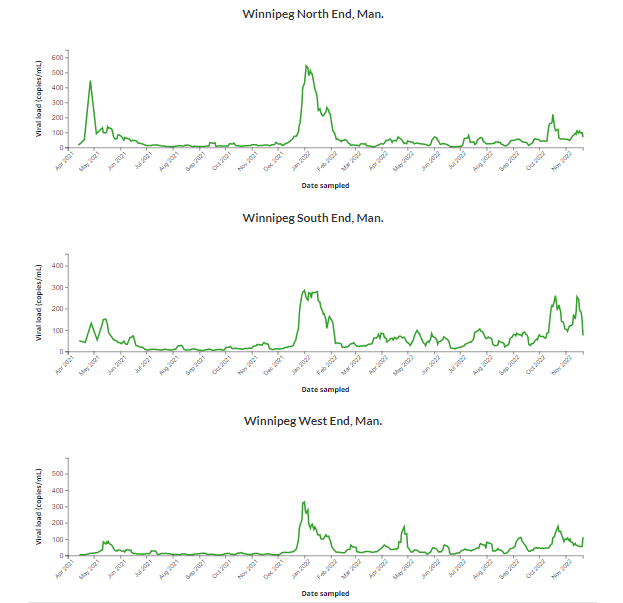Wastewater could become new front for flu detection
Advertisement
Read this article for free:
or
Already have an account? Log in here »
To continue reading, please subscribe:
Monthly Digital Subscription
$0 for the first 4 weeks*
- Enjoy unlimited reading on winnipegfreepress.com
- Read the E-Edition, our digital replica newspaper
- Access News Break, our award-winning app
- Play interactive puzzles
*No charge for 4 weeks then price increases to the regular rate of $19.00 plus GST every four weeks. Offer available to new and qualified returning subscribers only. Cancel any time.
Monthly Digital Subscription
$4.75/week*
- Enjoy unlimited reading on winnipegfreepress.com
- Read the E-Edition, our digital replica newspaper
- Access News Break, our award-winning app
- Play interactive puzzles
*Billed as $19 plus GST every four weeks. Cancel any time.
To continue reading, please subscribe:
Add Free Press access to your Brandon Sun subscription for only an additional
$1 for the first 4 weeks*
*Your next subscription payment will increase by $1.00 and you will be charged $16.99 plus GST for four weeks. After four weeks, your payment will increase to $23.99 plus GST every four weeks.
Read unlimited articles for free today:
or
Already have an account? Log in here »
Hey there, time traveller!
This article was published 25/11/2022 (1113 days ago), so information in it may no longer be current.
Sewage surveillance for flu cases could soon be a national reality.
Scientists are working on validating tests to detect influenza and respiratory syncytial virus (RSV) in wastewater. The tests aim to detect A and B strains of both viruses, the Public Health Agency of Canada confirmed Friday.
The federal agency, which operates the National Microbiology Lab in Winnipeg, shared few details about the development of the tests, and has not announced a timeline for their launch across the country. Some Canadian municipalities, such as Ottawa, are already testing wastewater for the flu.

Scientists are working on validating tests to detect influenza and respiratory syncytial virus (RSV) in wastewater. The tests aim to detect A and B strains of both viruses, says the Public Health Agency of Canada, which operates the National Microbiology Lab (above) in Winnipeg. (Mike Deal / Winnipeg Free Press files)
It’s the latest in a long line of efforts to use sewage as a quick means of finding out about outbreaks of viruses — including polio and monkeypox — since viral load shows up in municipal wastewater much faster than confirmed cases of disease can be detected and reported by governments.
It’s an exciting scientific area, but there are still many unanswered questions about wastewater data and its ability to accurately reflect community transmission of a virus, said Dr. Philippe Lagacé-Wiens, a medical microbiologist at St. Boniface Hospital in Winnipeg.
“It’s still a new and growing science, so it can be really challenging to interpret the results of wastewater testing, and when you start throwing in new viruses or new organisms… you add new challenges to the interpretation,” he said, pointing out other birds and mammals also shed the same strains of influenza, which can end up in wastewater.
“It’s one thing to be able to detect influenza in wastewater. It’s a very different thing to tell where it’s coming from.”
For now, the federal online wastewater surveillance dashboard only monitors COVID-19.
COVID wastewater trends appear to be increasing in Winnipeg’s north end, decreasing in the west end, and remaining the same in the south end, according to the latest wastewater trend data updated on the dashboard Friday.
Levels fluctuate so often interpreting short-term data is difficult. Data from Nov. 21 shows a 37 per cent decrease in the north end, a 71 per cent decrease in the south end, and an 81 per cent increase in the west end of the city, compared with Nov. 14 levels.
Work to test wastewater for monkeypox and polio is ongoing in Canada.
“Since wastewater testing is different than clinical testing to diagnose active virus infections, it could potentially provide an additional, independent indicator of community transmission,” PHAC spokeswoman Anna Maddison stated in an email.
Federally funded research tested wastewater for monkeypox in 10 Canadian cities between June and September as part of national work to develop tests that can detect trace amounts of the virus.
Scientists published their findings in a draft research paper earlier this month, concluding wastewater monitoring for monkeypox is an important part of public health surveillance, but more work still needs to be done on testing.

A drawback of the study is the research used anonymous labelling for the municipalities, so although there were positive test results in each province, it’s unknown where wastewater was faster at detecting monkeypox or where it lagged behind clinical confirmed cases. The researchers noted precise geographic data could help pinpoint vulnerable populations and determine where to send vaccines.
In September, the National Microbiology Lab started testing wastewater for polio in some municipalities deemed to be higher risk, but nowhere in Canada has polio been detected. Those wastewater tests would have to be confirmed at the U.S. Centers for Disease Control and Prevention if one ever did come up positive, PHAC stated.
Wastewater data has a lot of potential, Lagacé-Wiens said, but the public needs to be informed about its limits.
“This is very exciting to scientists and public health as potentially game-changing information, but what’s really missing from our understanding as scientists and also our messaging to the public is we don’t know what kind of thresholds we are dealing with. There is a lot of variability in that data,” he said.
In Manitoba, hospital visits are still on the rise due to respiratory viruses. There were 82 hospital admissions related to COVID-19 and 14 flu-related admissions last week.
The provincial respiratory virus epidemiological report for the week of N0v. 13-19, posted Friday, shows an 18.2 per cent weekly test positivity rate for COVID (388 cases) and 15.6 per cent test positivity for influenza (160 cases). The reformatted reports only include lab-confirmed cases.
There were 62 detected cases of RSV, with a test positivity rate of 5.6 per cent.
katie.may@freepress.mb.ca

Katie May is a general-assignment reporter for the Free Press.
Our newsroom depends on a growing audience of readers to power our journalism. If you are not a paid reader, please consider becoming a subscriber.
Our newsroom depends on its audience of readers to power our journalism. Thank you for your support.

